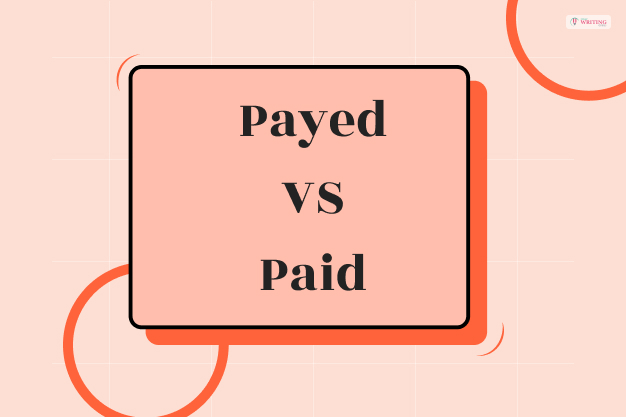Have you paid him yet? Did you pay attention during your history lessons? Or should I say if you paid attention, you would have known that past tense and the past participle tense of pay? Well, by now, you must have understood by my excessive use of the word “paid” that I am going to talk about that in this article.
We are going to talk about payed vs paid in this article. The verb pay is an irregular verb, but it is not a very difficult one. The present participle form of the verb is paring, and the past participle form is paid. But there is a specific usage of the verb pay, which has a particular spelling for its past participle form, and that is payed. That is what is creating all the fuss.
Payed vs paid: The difference
The basic difference lies in the meaning of pay. What you mean by the word ‘pay’ determines the past and the past participle spelling.

- We use the word paid when we are talking about some kind of transaction or some obligation. Like paying after buying something, or when you pay attention to something or pay respects, pay a visit, or pay a compliment. These are the situations where we use paid.
- We use the word payed only in two specific scenarios. The first is where we refer to covering parts of a ship with tar, pitch, or some kind of coating. The other one is where we mean to move the ship toward the direction of the wind.
This is the basic difference between the two words, as they are used in completely different scenarios, and they mean different when they are put into context.
How to use the word “paid” in a sentence?
As mentioned above that, pay is an irregular verb, and it can sometimes be used as an adjective as well, where it refers to returning some favors or services or hiring someone for money, or fulfilling a debt.
Examples with “paid” in the sentence
- Paul paid Ian fifty dollars for the old furniture that he got for his new apartment.
- The engineers paid the price for their wrongdoings after the bridge collapsed and took the lives of several people.
- He paid the debt for his forefathers and cleared their names.
- Though the mistake was completely on their part, I paid the full amount. I am going to lodge a complaint against the company on the consumer forum.
- She got paid for all the work she did last month, but it would have been better for it if they had paid her immediately, keeping in mind the condition of her family.
- “The measure, which emerged from the Senate Ways and Means Committee this week, would establish 16 weeks of paid family and medical leave and up to 26 weeks of disability pay.” – The Boston Globe
- “Tributes have been paid to Garry Marshall, creator of hit US TV series Happy Days, who has died aged 81.” – BBC
- The band made a medley of the most popular songs by the legendary singer and performed it on stage and paid tribute to the late singer.
- Ben paid back the favor by getting Gary out on bail as he was caught by the county police for speeding.
- I paid extra for the ticket as the there were no seats available, but the broker said he would definitely get me one.
How to use the word “payed” in a sentence?
Payed is also the past tense of the rare meaning of ‘pay,’ which actually refers to coating a boat or its different parts with some sort of waterproof material.
A few examples of payed
- The sailors payed the boat with paint.
- “They payed out the rope, but it just wasn’t long enough.”
- “The crews of the fleet payed their boats to the east in a desperate attempt to avoid the incoming storms.”
- “To make the boat seaworthy, a sailor payed the open creases between the planks with hot tar.”
- “She payed the deck with tar.”
Paid off or payed off
Confused about paid vs payed off? Don’t be. The past tense of “pay off” or “paying off” is “paid off.” this is a very common expression that we use when we refer to clearing a debt in full. This can also be used while referring to the good outcome that comes out as the result of your hard work. But in both cases, the correct term is “paid off” and not “payed off.”
Let’s check out some examples
- Bradley finally paid off his student loan the previous month.
- Monica won the title of the best musician of the year, and her hard work has paid off.
- Ben paid off his father’s loan in full to the broker and released a sigh of relief.
- Joe paid off the man to do his dirty work.
- I paid off the building tax for the whole year in advance to get the rebate.
Bottom line
It is not very difficult to understand payed vs paid, as payed has only one use, and it is used only when you are referring to sailing or painting a boat. All the other uses of the past tense of pay used the spelling paid.
“Paid vs payed” or “paid vs payed attention” are common terms that people get confused about. The past of paying attention is “paid attention.” I hope this article will help you in understanding things better. Paid is the commonly used spelling, and payed is only used in reference to sailing. With this, I rest my case about payed vs paid.
MORE FOR YOU:
- Dryer VS. Drier: All You Have To Know
- Lives Or Lifes: Which Is The Correct Form?
- lense vs lens: Which Is The Correct Spelling?
